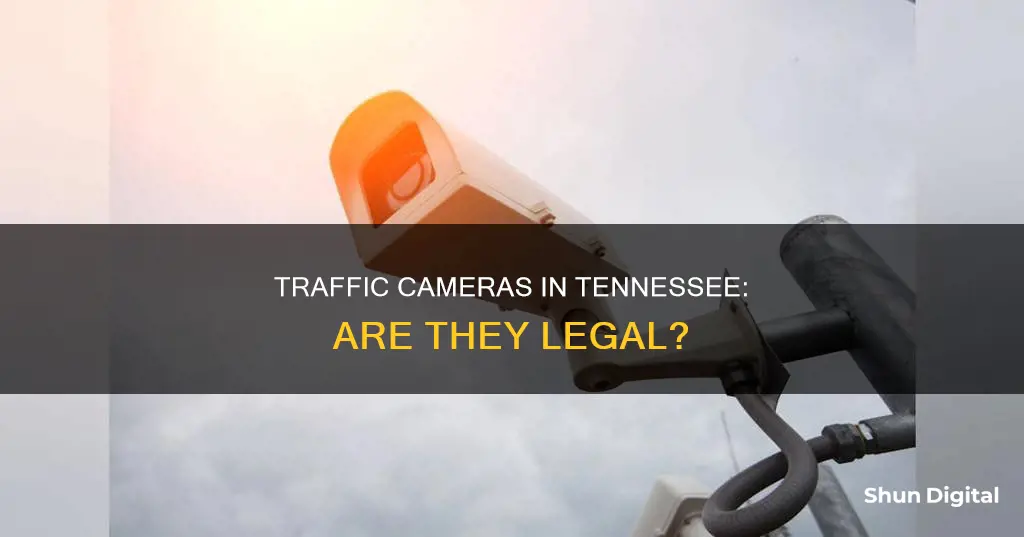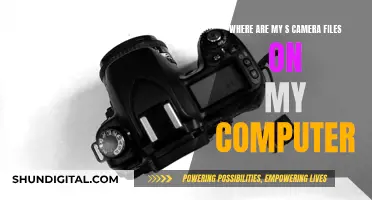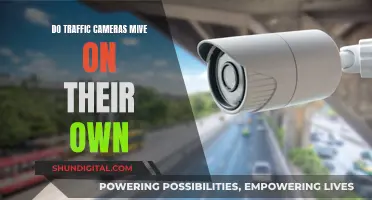
The use of traffic cameras in Tennessee has been a highly debated topic, with some cities using them to monitor and enforce traffic violations, while others have removed them. While supporters argue that they reduce dangerous crashes and provide revenue for local governments, opponents criticise them for being more about generating money and increasing rear-end collisions. With the emergence of Public Chapter No. 425 (HB1500/SB1684), T.C.A. § 55-8-198, the landscape of traffic enforcement cameras in Tennessee underwent significant changes, including the requirement for traffic engineering studies prior to new camera installations. The legality of these cameras and the associated fines has sparked confusion among residents, with a state lawmaker encouraging people to disregard these fines.
| Characteristics | Values |
|---|---|
| Legality of traffic cameras in TN | Contentious issue; not explicitly illegal but opposition is gaining ground |
| TN state lawmaker's stance | Planning to introduce an outright ban during the 2020 legislative session |
| Number of TN cities using red-light cameras | 16 |
| Number of TN cities using speed cameras | 13 |
| Revenue from red-light cameras for Memphis in 2018 | $3.8 million |
| Average yearly revenue from red-light and speed cameras for Union City | $253,000 |
| Maximum fine for traffic camera violation | $50 |
| Classification of traffic camera citations | Non-moving violations |
| Impact of non-payment of fines on credit score or driver's license | None |
| Possibility of being taken to civil court for non-payment | Rare due to associated costs outweighing fine amount |
What You'll Learn

Traffic camera fines are civil penalties, not criminal offenses
In the state of Tennessee, for example, if you receive a red-light camera ticket or any other photo enforcement citation, it is considered a civil citation. According to West Tennessee State Representative Andy Holt, these citations are not criminal offenses, and individuals are not legally required to pay the associated fines. However, cities with red-light cameras may still attempt to collect payment through letters, threats, and collection notices.
The distinction between civil and criminal offenses is important in the context of traffic violations. Civil infractions, such as speeding, running a red light, or failure to yield, are generally treated less severely than criminal offenses. They are often categorized as infractions or civil offenses, with penalties typically limited to fines, points on your driving record, or increased insurance rates. These cases are usually handled in traffic courts, where individuals have the opportunity to contest the ticket and present evidence.
On the other hand, more serious driving-related offenses, such as driving under the influence (DUI), reckless driving, or vehicular manslaughter, are typically considered criminal offenses and are handled in criminal courts. These offenses can carry more severe penalties, including potential jail time, license suspension, or even felony charges in some cases.
It's worth noting that the classification of traffic violations can vary by state, and there may be circumstances where a traffic violation escalates from a civil to a criminal matter. For example, multiple or repeated civil infractions can lead to more severe consequences, including the possibility of criminal charges. Additionally, certain traffic violations, such as driving with a suspended license or hit-and-run incidents, can be considered criminal offenses in some jurisdictions.
When dealing with traffic camera fines or any other traffic violations, it is always advisable to seek legal advice or consult with a traffic defense lawyer to understand your specific rights, options, and potential consequences. They can provide guidance on contesting or mitigating the penalties associated with civil or criminal traffic infractions.
Autofocus Camera Lenses: Essential Feature or Gimmick?
You may want to see also

Tennessee cities negotiate their own terms for fines collection
The use of traffic cameras in Tennessee has been a controversial topic for over a decade, with supporters citing safety benefits and opponents criticising them as a revenue-generating tool for private camera contractors and local governments. While the state legislature has been pushing for a ban on these cameras, local governments and police forces rely on the income they generate.
In Tennessee, each city negotiates the terms of fines collection with its camera vendor. This means that the process for collecting fines can vary depending on the specific agreements in place between the city and the company operating the cameras. While some cities may choose to send unpaid fines to a debt collection agency or take violators to civil court, these practices are rare due to the costs involved, which would likely outweigh the $50 fine amount.
State law classifies traffic camera citations as non-moving violations, which means they cannot affect a driver's license points. Additionally, the law prohibits camera companies and cities from notifying credit agencies about unpaid fines, and there are strict requirements for the signage and placement of these cameras.
The debate over the legality and effectiveness of traffic cameras in Tennessee continues, with some cities choosing to remove the cameras while others continue to use them. While there is legislation in place to regulate their use, each city has the autonomy to negotiate its own terms for fines collection, leading to variations in how traffic camera fines are enforced across the state.
In summary, while the use of traffic cameras is legal in Tennessee, the specific terms and conditions surrounding their operation and enforcement vary from city to city. The controversy surrounding these cameras and their effectiveness in improving road safety remains a topic of discussion among lawmakers, residents, and law enforcement officials.
Are Camera Batteries Safe for Flying?
You may want to see also

A traffic engineering study is required before installing a new unmanned camera
The use of traffic cameras in Tennessee has been a contentious issue, with the matter being hotly debated during the 2011 Tennessee General Assembly. The resulting legislation, Public Chapter No. 425 (HB1500/SB1684), T.C.A. § 55-8-198, made significant changes to the rules surrounding traffic enforcement cameras. One of the most important changes was the requirement that a traffic engineering study be conducted before the installation of any new unmanned traffic enforcement camera.
This study must be completed in accordance with the standard engineering practices of the Institute of Transportation Engineers (ITE) and must be certified by a licensed engineer who specialises in traffic engineering. The legislation specifically prohibits a traffic camera vendor from conducting the study or participating in the selection of the engineer. This measure ensures that the study is conducted independently and that there are no conflicts of interest.
The purpose of the traffic engineering study is to assess the need for an unmanned traffic enforcement camera and to ensure that it is installed in a suitable location. The study will likely involve analysing traffic data, such as vehicle speeds and accident rates, to identify areas where safety may be a concern. By conducting this study, municipalities can make informed decisions about the placement of traffic cameras, ensuring that they are used effectively to improve road safety.
In addition to the traffic engineering study, the legislation also outlines other requirements that must be met before installing an unmanned traffic enforcement camera. For example, the legislation sets out the evidence required to ticket vehicles for failing to come to a complete stop or making an unlawful turn at a red light. It also places restrictions on the use of speed cameras, limiting their use to designated areas such as school zones and S-curves on public roads. These provisions aim to standardise the use of unmanned traffic enforcement cameras and ensure that they are deployed fairly and transparently.
Troubleshooting Camera Focus Issues on the Nikon D7500
You may want to see also

The use of traffic cameras is controversial
The debate over the use of traffic cameras in Tennessee centres around the question of public safety versus privacy and government surveillance. On the one hand, traffic cameras are seen as an effective tool for enforcing traffic laws and improving road safety. Proponents of traffic cameras argue that they can help reduce the number of dangerous "T-bone" crashes and make drivers more cautious, ultimately saving lives.
However, opponents of traffic cameras raise concerns about government overreach and the potential for abuse of power. They argue that the presence of traffic cameras allows for constant monitoring and tracking of citizens' movements, which infringes on their privacy and civil liberties. There is also the belief that traffic cameras are primarily installed to generate revenue through fines, rather than to improve safety. This is supported by the fact that camera companies and local governments often profit from the fines collected from traffic violations caught on camera.
The controversy is further fuelled by the mixed evidence regarding the effectiveness of traffic cameras in improving road safety. While some studies show a reduction in certain types of crashes, others indicate an increase in rear-end collisions. Additionally, there are concerns about the accuracy and reliability of traffic camera technology, with the potential for false or inaccurate readings leading to unfair citations.
The use of traffic cameras has also sparked legal debates, with questions arising over the admissibility of camera evidence in court and the constitutionality of using automated systems for law enforcement. In Tennessee, the legality of traffic enforcement cameras was hotly contested during the 2011 Tennessee General Assembly, resulting in the passage of Public Chapter No. 425, which made significant changes to the traffic enforcement camera landscape.
Renault's Driverless Car: A Multi-Camera System
You may want to see also

Traffic camera citations are non-moving violations
In the state of Tennessee, there are specific rules regarding traffic cameras. A municipality must conduct a traffic engineering study before installing a new unmanned traffic enforcement camera. This study must be certified by a licensed engineer specializing in traffic engineering and must be completed in accordance with the standard engineering practices of the Institute of Transportation Engineers (ITE). A vendor is prohibited from conducting the study or participating in the selection of the engineer.
Traffic camera citations are mailed to the registered owner of the vehicle within a certain period, typically within 10 to 90 days of the alleged violation. The registered owner then has a set period, usually 30 days, to respond to the citation. The penalties for a red light or speed camera ticket are generally less severe than for a non-camera traffic citation. A conviction will typically result in a fine of $100 or less, and in most states, no demerit points will be added to the offender's driving record. However, in some states, a camera citation carries the same penalties as a citation issued by an officer in person.
It is important to note that traffic camera citations are not considered moving violations, which are when a driver is pulled over and issued a ticket by a law enforcement officer. Moving violations typically assess points against the driver's license, whereas non-moving violations, such as camera tickets, do not. While non-payment of a camera citation may not impact your driving record or license, it could result in late fees and the suspension of your driver's license. Additionally, past-due tickets may put a hold on your registration renewal or result in your car being booted.
Who Created the First JSH04 Camera?
You may want to see also
Frequently asked questions
Yes, traffic cameras are legal in Tennessee. However, there are several laws surrounding their use, and they are the subject of much controversy.
There is a lot of opposition to traffic cameras in Tennessee, with opponents arguing that they are more about generating money than about safety, and that they increase rear-end collisions.
There are several laws in place surrounding the use of traffic cameras in Tennessee, including:
- A requirement that a municipality conduct a traffic engineering study prior to the installation of a new unmanned traffic camera.
- A prohibition on the use of unmanned traffic cameras to monitor speed, except within designated school zones and S-curves on public highways.
- A requirement that only POST-certified or state-commissioned law enforcement officers review video evidence and determine if a violation has occurred.
- A limit on traffic camera fines to $50 each.
While you may receive a fine in the mail, Tennessee state law classifies traffic camera citations as non-moving violations, meaning they cannot count against your driver's license points. State Representative Andy Holt has said that these fines do not have to be paid, and that non-payment cannot adversely affect your credit score, driver's license, or automobile insurance rates.
Yes, there is currently a proposal to ban traffic enforcement cameras statewide, which would meet opposition from local governments and police who rely on the revenue. There have also been previous attempts to change the laws, such as a 2015 bill banning new contracts for speeding cameras, and a 2016 bill requiring traffic camera companies to include a statement on citations that non-payment cannot adversely affect the recipient's credit score, driver's license, or automobile insurance rates.







